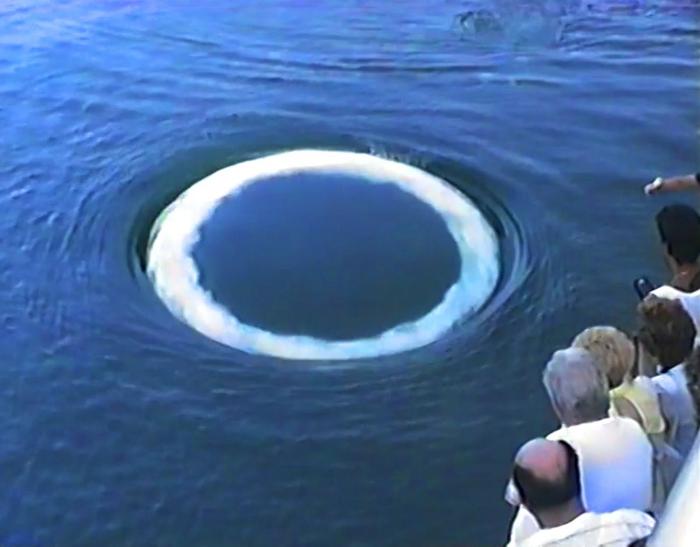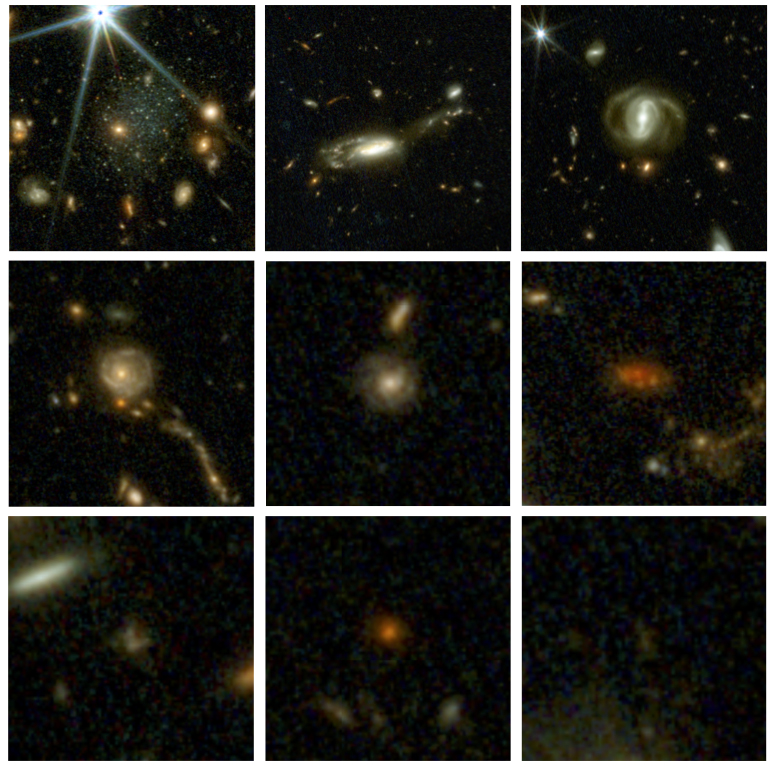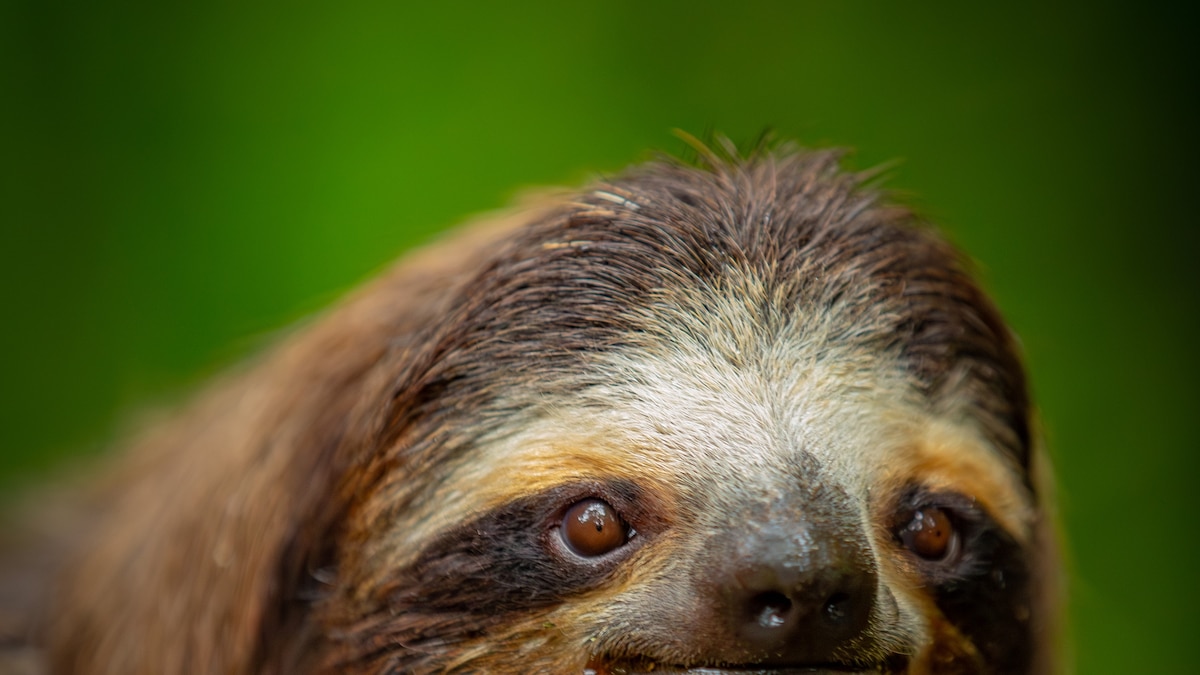Now Reading: Camping, glamping, motels and more! Here are the best places to stay in Joshua Tree
-
01
Camping, glamping, motels and more! Here are the best places to stay in Joshua Tree
Camping, glamping, motels and more! Here are the best places to stay in Joshua Tree
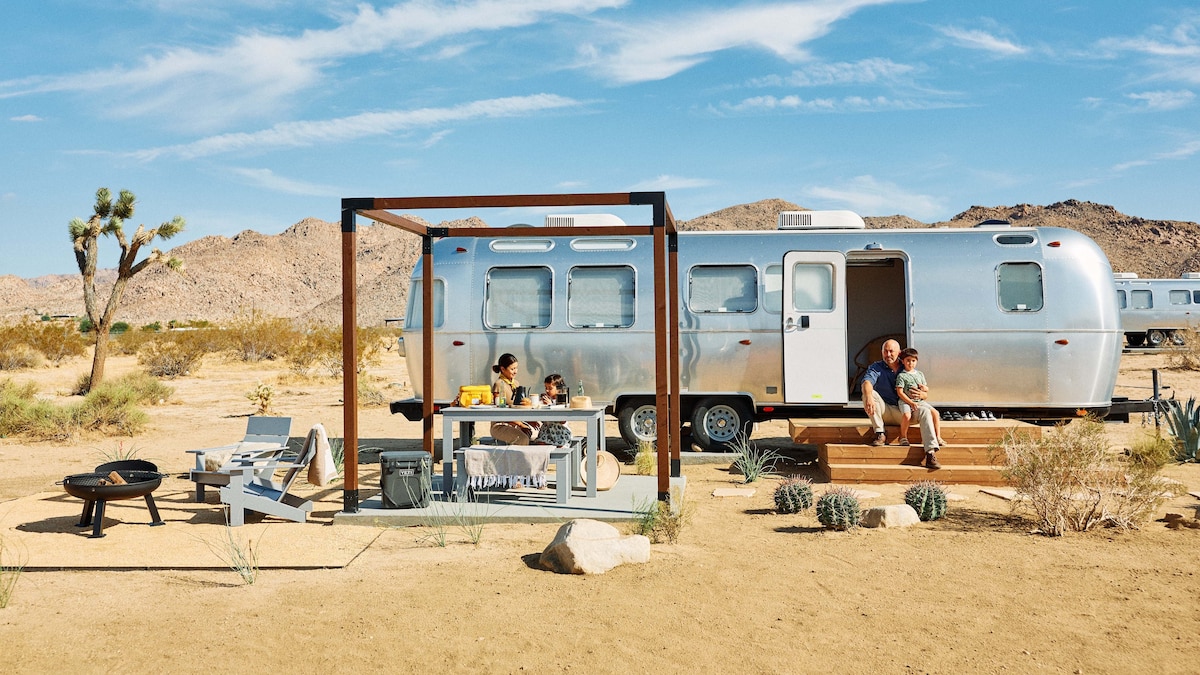
During its long tenure as a national monument (1936-1994), Joshua Tree was largely a do-it-yourself park where visitors had to fend for themselves, especially when it came to accommodation.
Park brochures at that time explicitly stated, “Neither meals nor lodging are available in the Monument.” Campgrounds didn’t appear until the 1950s and they were very primitive, little more than a patch of sand with a picnic table.
The turning point was Joshua Tree getting upgraded to national park status in 1994. Ever since, the accommodation situation has continued to improve. Camping is still the only way to sleep inside the park. But the range of overnight options in the gateway towns of Yucca Valley, Joshua Tree, and Twentynine Palms has undergone a quantum leap.
(Everything you need to know about Joshua Tree National Park)
Camping in Joshua Tree National Park
Best for: Family campers
The national park boasts nine campgrounds with more than 500 total spaces. Sites at five campgrounds can be reserved up to six months in advance at Recreation.gov while the other three are first-come, first-serve.
Reservations are highly recommended during the park’s high season between October and May when milder weather lures far more visitors than the triple-digit summer months.
Black Rock Campground inside the west entrance and Cottonwood Campground near the south entrance offer the best amenities including potable water, flush toilets, and dump stations for RVs.
But that doesn’t mean they’re the most sought-after overnight spots. That honor goes to Jumbo Rocks Campground in the middle of the park, where you can pitch a tent or spread a sleeping bag amid the cluster of giant boulders that includes iconic Skull Rock.
Joshua Tree’s campgrounds are all situated between 3,000 and 4,400 feet above sea level, which means that nighttime temperatures often dip between 30 and 40°F during the winter, and there’s even the possibility of snow.
Campsite rates range from $25 per night at the first-come, first-serve campgrounds to $35 per night at the most developed.
(A complete guide to hiking in Joshua Tree National Park)

Visitors to Joshua Tree have the option to stay at a remote campsite accessible only by backpacking in the park, but a backpacking permit is required. Visitors can set up camp a mile from the main trail and 500 feet from any trail.
Photograph by Ben Horton, Nat Geo Image Collection
Camping outside of Joshua Tree National Park
Best for: Budget travelers
Several federal agencies—including the Bureau of Land Management (BLM)—allow free-of-charge “dispersed camping” on public lands throughout the nation including several places near Joshua Tree National Park. There are no formal campgrounds and no amenities, just patches of land where visitors can pitch a tent or park an RV for the night.
One of the most popular dispersed camping areas near Joshua Tree is along Cottonwood Springs Road between the south entrance and Interstate 10. There’s another BLM-dispersed camping area on the north side, at the far eastern end of East Broadway between Joshua Tree town and Twentynine Palms. Dispersed camping may be free, but it comes without any facilities (including bathrooms) and no security. This is an option for visitors who enjoy the authentic camping experience.
(8 family-friendly things to do in Joshua Tree)
Best for: Comfort seekers
Visitors to Joshua Tree don’t have to “rough it” but also have several accommodations that offer upscale accommodations or glamping, such as safari tents, small houses, and vintage trailers. These types of accommodations are found in the desert on the park’s north side.
The most upscale and best equipped is Autocamp Joshua Tree, a shimmering silver village of new (rather than reconditioned) Airstream trailers that can sleep up to four people. Outfitted with bathrooms, showers, and kitchenettes, the trailers are also heated and air-conditioned and boast a private outdoor grilling and eating area. There’s a fully accessible tiny house with similar features. The camp revolves around a clubhouse with a restaurant, a general store, and an outdoor swimming pool. On weekends, the camp offers live tunes and group yoga sessions.

AutoCamp Joshua Tree is an upscale option for campers looking for comfort versus a backcountry camping experience.
Photograph courtesy AutoCamp

In addition to a Clubhouse (seen above), AutoCamp Joshua Tree’s amenities include activities available to guests such as sound baths, guided hikes, guided rock climbing adventures, and private stargazing tours.
Photograph courtesy AutoCamp

Guests can check into this suite inside a 31-foot Airstream which features a bright and airy sitting room, private full bathroom, and kitchenette.
Photograph courtesy AutoCamp
Despite its tongue-in-cheap name, Hicksville Trailer Palace on Foxy Flats Road is a hip place to stay. A time trip back to the mid-20th century, the camp features eight vintage trailers (plus a teepee, houseboat, and “zombie bunker”) arrayed around a kidney-shaped pool. Other on-site amenities include a rooftop hot tub for evening stargazing, archery, a BB gun range, shuffleboard, corn-hole, table tennis, and a plastic ball pit for adults to jump into and roll around in.

At Hicksville Trailer Palace, guests can stay in this inventive trailer, The Intergratrailer, a direct homage to the Integratron located close by in Landers, Calif.
Photograph courtesy Hicksville Trailer Palace

UFO-ologist George Van Tassel designed the Intergratrailer after directions were given to him by visitors of the planet Venus, and completed it in 1959.
Photograph courtesy Hicksville Trailer Palace
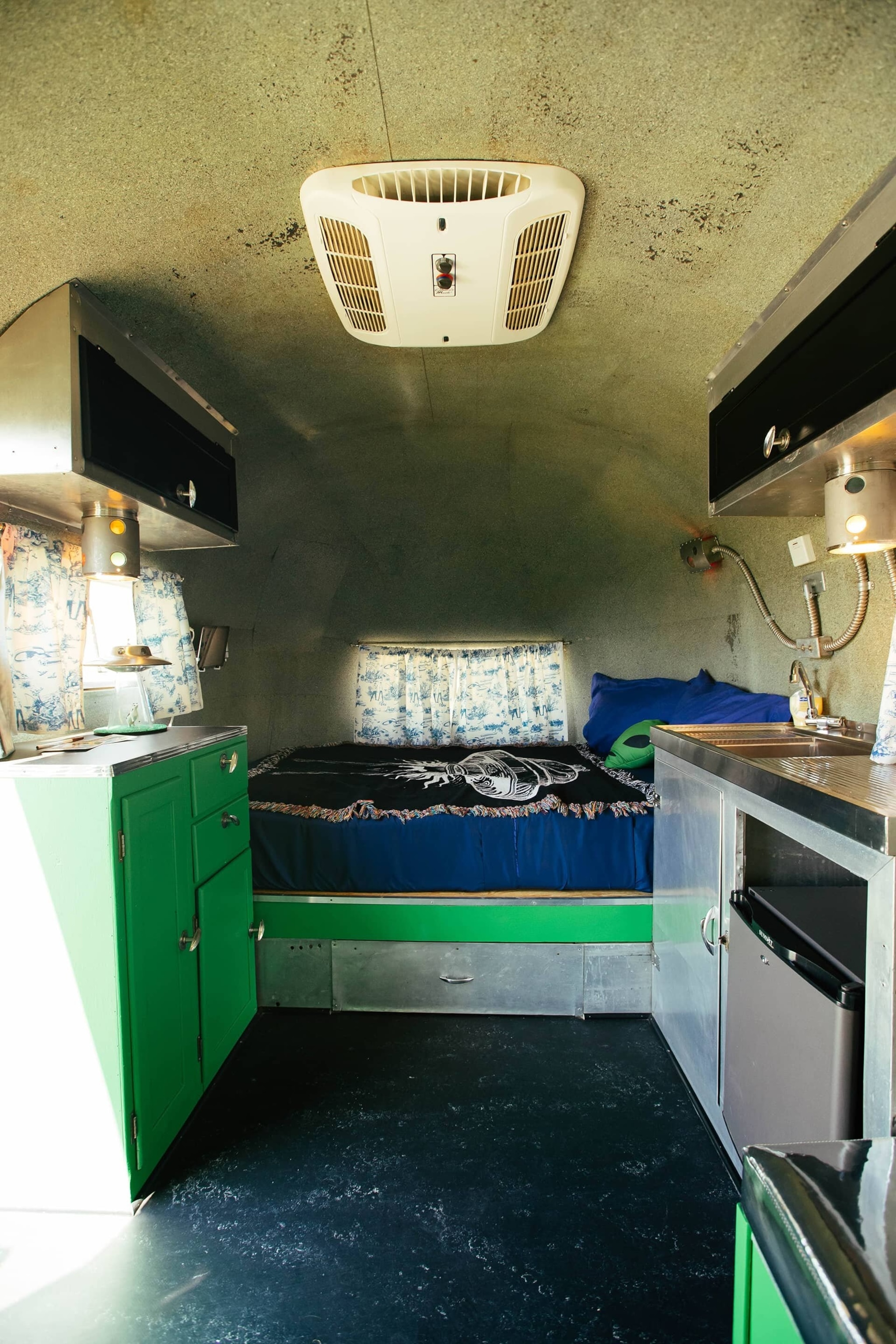
The Intergratrailer at the dog-friendly Hicksville Trailer Palace features a double bed, mini fridge, computer workstation, and an AC/heat unit.
Photograph courtesy Hicksville Trailer Palace
Best Luxe house stays
Best for: Upscale nomads
The Bungalows by Homestead Modern also boast a mid-century modern vibe. Ranging from studios to suites, the post-and-beam-style cabins feature retro furnishings, kitchenette, fully equipped bathroom, and sleeps two adults in a king-sized bed. Guests have access to the swimming pool, Food for Thought Café, and classes in the adjoining Joshua Tree Retreat Center.
Among the other luxe house stays near Joshua Tree are the mirror-wrapped Invisible House and the flying-saucer-shaped Area 55 Futuro House.

For a mid-century modern vibe, guests can check into The Bungalows by Homestead Modern in Yucca Valley, Calif.
Photograph courtesy Jaime Kowal, Homestead Modern

The Bungalows by Homestead Modern features 14 rooms with private patios and indoor and outdoor dining spaces.
Photograph courtesy Jaime Kowal, Homestead Modern

Bungalows also include a full kitchen (or kitchenette in double rooms) with bakeware, cookware, utensils, and silverware.
Photograph courtesy Jaime Kowal, Homestead Modern
Best mid-century modern motels
Best for: Nostalgia lovers
If the real deal is your thing rather than refurbished retro, the Joshua Tree Inn takes you back to 1949 when it first opened via the Spanish-colonial furnishings and architecture that was mega-popular at that time. For fans of vintage country rock, it’s also the place where Gram Parsons spent his last days. Located along the main drag in Joshua Tree town, the inn is just down the road from an official national park visitor center and only a 12-minute drive from the park’s west entrance.
On the east side of Joshua Tree town, the Mojave Sands Motel offers another take on desert mid-century modern. The eclectic digs along the Twentynine Palms Highway on the north side of the park are complemented by hundreds of places to stay in Palm Springs and other Coachella Valley communities, all of them around an hour’s drive from a park entrance.













